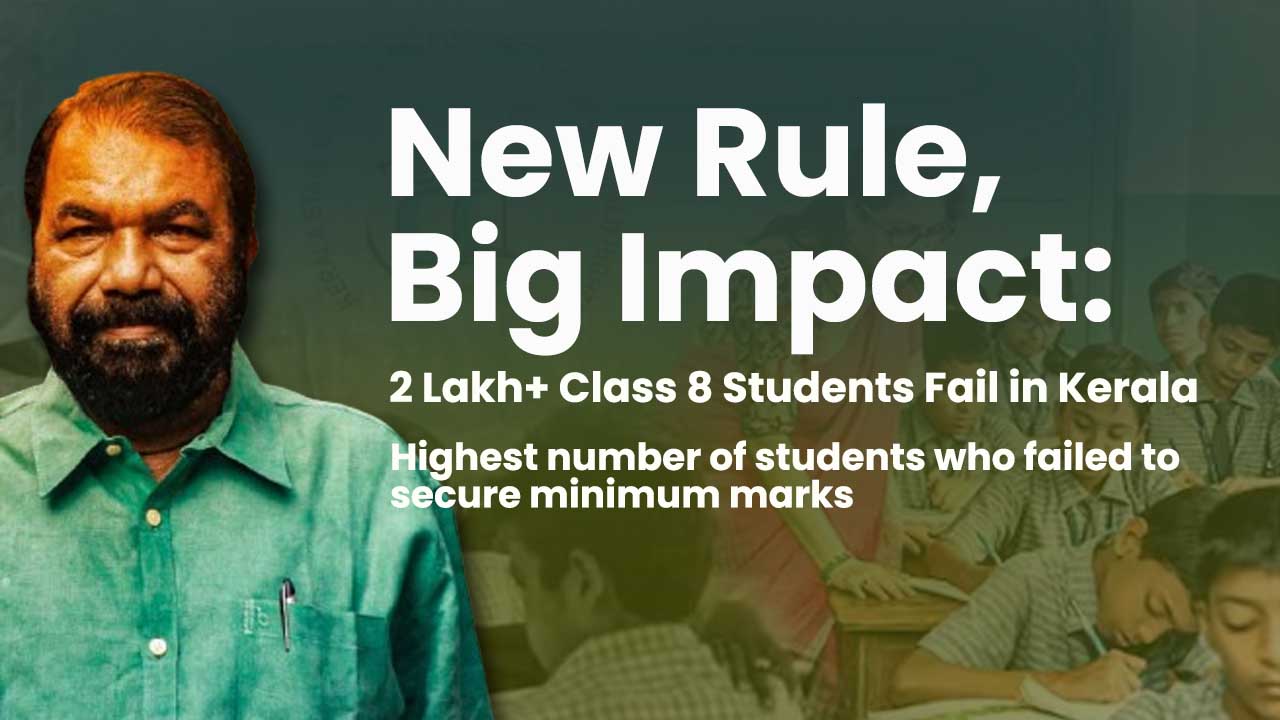Loading advertisement...
07-04-2025

Over 2 Lakh Class 8 Students Fail in Kerala: A Shocking Turn in the Education System
In an unexpected and deeply concerning outcome, more than 2 lakh Class 8 students in Kerala have failed their annual examinations this year. The news has sparked widespread debate across the state, with educators, parents, and students reeling from the impact of a new academic policy that many say was rolled out too abruptly.
In a bold and compassionate move, Kerala Education Minister V. Sivankutty has officially announced that all Class 8 students across the state will be promoted to Class 9, regardless of their performance in the annual examinations. This decision, made with the best interest of students in mind, marks another progressive step in Kerala’s approach to equitable and empathetic education.
A Policy Rooted in Empathy and Educational Vision
Addressing the media, Minister Sivankutty stated that no student should be burdened by fear of failure, especially at such a critical developmental stage. Instead of penalizing students for academic struggles, the focus will now be on academic support and inclusive learning.
“We should not treat exams as a tool for filtering students out, but as an opportunity to understand where they need help. No Class 8 student in Kerala will be detained this year,” – V. Sivankutty, Education Minister
While all students will be promoted, the government is not overlooking the importance of academic standards. The Education Department has planned remedial programs and bridge courses for students who show signs of academic lag. These special classes will ensure they are well-prepared for the challenges of Class 9.
Officials have clarified that schools will receive guidance on identifying struggling students early and implementing targeted interventions without creating pressure or stigma.
Expert Opinions: A Win for Mental Health and Holistic Learning
Child psychologists and educational experts have welcomed the decision, saying that retaining students often causes more harm than good. Repeating a class has been linked to lower self-esteem, increased dropout rates, and long-term academic disengagement.
“This policy aligns with modern pedagogical thinking. Students learn best in an environment that builds confidence and offers support, not fear,” says Dr. Meera Nair, a child development specialist based in Kochi.
Parent and Teacher Reactions: Relief and Responsibility
Many parents across the state have expressed their relief and gratitude, especially those whose children were anxious about exam results. Teachers have also responded positively, viewing this as an opportunity to shift from a results-driven model to a learning-focused classroom.
However, educators also acknowledge that the success of the initiative will depend on how effectively schools implement the follow-up support promised by the government.
While the state will promote all students, internal assessment data reveals stark differences in performance:
📍 Wayanad recorded the highest number of students who failed to secure minimum marks, with a notable struggle in subjects like Hindi.
📍 Kollam, on the other hand, had the lowest number of students receiving failing grades, indicating stronger overall academic performance.
The minimum mark required to pass each subject was 30%. Many students who didn't meet this mark received ‘E’ grades, signaling the need for extra academic support.
A Step Toward Long-Term Educational Reform
Kerala has long been a trailblazer in educational policies, and this new step reinforces its commitment to a child-friendly schooling system. It resonates with the principles of the National Education Policy (NEP), which emphasizes continuous evaluation, flexibility, and mental well-being over rote-based assessments.
This no-fail policy could serve as a pilot for similar reforms in other classes, especially at the elementary and middle school levels.
What’s Next?
The government is expected to issue detailed guidelines to schools in the coming days, including:
How to assess students needing extra academic support
Implementation plans for bridge courses
Monitoring and evaluation methods for student progress in Class 9
Minister V. Sivankutty’s announcement is more than just a change in promotion criteria — it’s a philosophical shift in how we perceive student success. By replacing fear with support and punishment with guidance, Kerala is once again setting a national example in education reform.
As we move forward, this decision will likely spark important discussions across India about how to balance academic rigor with student mental health and inclusive growth.
For More Updates,join us and stay connected!